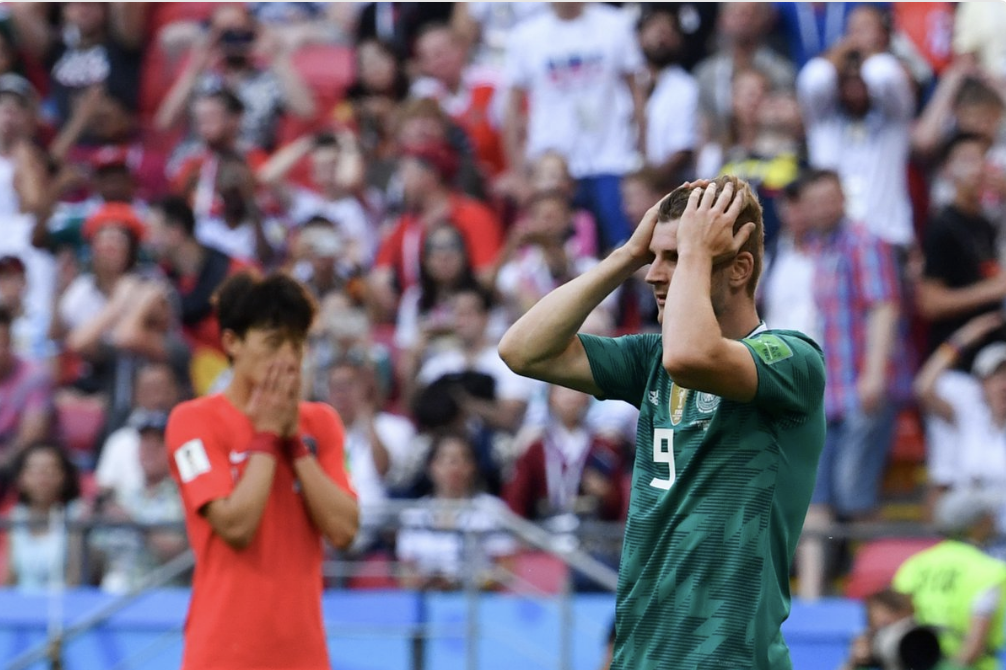World War II, the moon landings, the Internet, rock and roll, Donald Trump.
All this, and more, has happened since the last time Germany got knocked out of the World Cup in the group stages in 1938.
How do you react when something so rare happens? In my case, I stood in the middle of my living-room at 2am, gawping like an idiot at the television. Others ranted on social media. Fresh off the ranks, here’s Hatch Macleay’s analysis of what the bloody hell happened.
It started as any pressure game for Die Mannschaft should, everyone assuming the world would continue as before, that, of course, the Germans would win. Early on the Koreans sat in and defended well, and with Tottenham Hotspur’s Son Heung Min up front, they carried a potent counter-attacking threat. But this has happened so many times for Germany: a team sits deep, but they know full well that, of course, just like the Swedes earlier in the tournament, they will concede, the Germans will win, and life will simply go on. Only this time it didn’t.

Talent is not a problem for this Germany side – their coach Joachim Low has built a dynasty since the 2010 World Cup. They’re a well-oiled machine of players who’ve grown up together and played through all the different youth levels, winning many tournaments on the way.
You have Manuel Neuer, who despite an injury-plagued season is still considered by many to be the world’s finest goalkeeper. In Mats Hummels you have a defender with the strength of an ox, but also a passing range and tactical intelligence that many top-class midfielders would envy. With Hummels flanked on his right by, arguably, the world’s best right-back, Joshua Kimmich, the defence couldn’t be the problem, could it? Let’s move onto the midfield.
😢 sorry …
— Mats Hummels (@matshummels) June 27, 2018
Sami Khedira has won titles in both Italy and Spain, he’s a cultured defensive midfielder with a foot like a traction engine. So he can’t possibly be the problem. His partner, Real Madrid metronome, Toni Kroos, is not the problem, either – on his right or left foot, he’s one of the best ball passers in Europe, a genius at finding space where there doesn’t look to be any, with a set-piece delivery to rival any on the planet. And with talent such as new Bayern Munich signing Leon Goretzka and Leverkusen wunderkind Julian Brandt, depth certainly isn’t the issue.
That leaves us with only one place to look: the attack. But again, there doesn’t look to be much amiss. Two-time golden boot winner and 2014 champion Thomas Muller’s there on the right. Arsenal’s talismanic creator-in-chief Mesut Ozil is there to string it all together. On the left is Marco Reus, who if not for his persistent injury problems would be considered among the most talented players of his generation. Leading the line is Timo Werner, one of the most sought-after young strikers in world football.

So, once again, where did it all go wrong? Tactically, it has to be said, this tournament has been an absolute shambles for the Germans. There’s been an air of complacency around the 2014 World Champions since the start, somewhat understandably considering their record. However, it all started badly against a lightning quick and tactically excellent Mexico side. Bringing their winger Carlos Vela in off the wing to man-mark Toni Kroos was a stroke of genius on the part of Mexican manager, Juan Carlos Osorio. But even so, to push right back, Kimmich so far up the field all the time, when Mexico’s biggest counter-attacking threat, left winger Hirving Lozano, was ready and willing to respond to and finish off any chance that came his way? Suicidal tactics, if ever there have been.
AHAHAHAHAHAHHAHAHAHAHAHAHAHAHAHAHAAHAHAHAHAHAHHAHAHAHAHAHAHAHAHAHAHAAHAHAHAHAHAHHAHAHAHAHAHAHAHAHAHAHAAHAHAHAHAHAHHAHAHAHAHAHAHAHAHAHAHAAHAHAHAHAHAHHAHAHAHAHAHAHAHAHAHAHAAHAHAHAHAHAHHAHAHAHAHAHAHAHAHAHAHAAHAHAHAHAHAHHAHAHAHAHAHAHAHAHAHAHAAHAHAHAHAHAHHAHAHAHAHAHAHAHAHAHAHA
— FOX Sports Brasil (@FoxSportsBrasil) June 27, 2018
(Brazil, whom the Germans beat 7-1 in 2014, seemed to enjoy the event.)
It was the same against the Swedes, Germany committing too many men forward, pushing against a strong and well-organised Swedish defence and leaving themselves open to the counter-attack. It was only thanks to Marco Reus’s well-taken finish and Toni Kroos’s world-class free kick that Germany pulled off a miraculous 2-1 victory after Ola Toivonen had opened the scoring for the Swedes. Against South Korea? It started better: Germany were more controlled, more calculating, but couldn’t find a breakthrough as a combination of wonderful goal-keeping from Korean custodian, Cho Hyun-Woo, and terrible finishing made the Germans more desperate.

After South Korea went 1-0 up with the help of VAR, Manuel Neuer lost his head completely, abandoning his post in goal and charging up to join the attack. The Germans, always so calm and collected, had completely lost it. And sure enough, a long ball out of defence saw Son Heung-Min tap into an empty net, the goalkeeper nowhere to be seen, to hammer the final nail into a coffin that had lain open since 1938. – @MaxGay93


